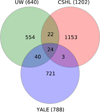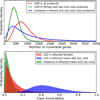The contribution of de novo coding mutations to autism spectrum disorder
- PMID: 25363768
- PMCID: PMC4313871
- DOI: 10.1038/nature13908
The contribution of de novo coding mutations to autism spectrum disorder
Abstract
Whole exome sequencing has proven to be a powerful tool for understanding the genetic architecture of human disease. Here we apply it to more than 2,500 simplex families, each having a child with an autistic spectrum disorder. By comparing affected to unaffected siblings, we show that 13% of de novo missense mutations and 43% of de novo likely gene-disrupting (LGD) mutations contribute to 12% and 9% of diagnoses, respectively. Including copy number variants, coding de novo mutations contribute to about 30% of all simplex and 45% of female diagnoses. Almost all LGD mutations occur opposite wild-type alleles. LGD targets in affected females significantly overlap the targets in males of lower intelligence quotient (IQ), but neither overlaps significantly with targets in males of higher IQ. We estimate that LGD mutation in about 400 genes can contribute to the joint class of affected females and males of lower IQ, with an overlapping and similar number of genes vulnerable to contributory missense mutation. LGD targets in the joint class overlap with published targets for intellectual disability and schizophrenia, and are enriched for chromatin modifiers, FMRP-associated genes and embryonically expressed genes. Most of the significance for the latter comes from affected females.
Figures












Comment in
-
The implications of de novo coding mutations in simplex autism families.Clin Genet. 2015 May;87(5):428-9. doi: 10.1111/cge.12582. Epub 2015 Mar 30. Clin Genet. 2015. PMID: 25753786 No abstract available.
-
Autism genes: the continuum that connects us all.J Genet. 2016 Sep;95(3):481-3. doi: 10.1007/s12041-016-0688-0. J Genet. 2016. PMID: 27659318 No abstract available.
References
-
- Levy D, et al. Rare de novo and transmitted copy-number variation in autistic spectrum disorders. Neuron. 2011;70:886–897. - PubMed
Publication types
MeSH terms
Grants and funding
- RC2 HL102926/HL/NHLBI NIH HHS/United States
- CAPMC/ CIHR/Canada
- RC2 HL102924/HL/NHLBI NIH HHS/United States
- HHMI/Howard Hughes Medical Institute/United States
- UL1 TR000142/TR/NCATS NIH HHS/United States
- R01 MH101221/MH/NIMH NIH HHS/United States
- RC2 HL102923/HL/NHLBI NIH HHS/United States
- UC2 HL102926/HL/NHLBI NIH HHS/United States
- U54 HD083091/HD/NICHD NIH HHS/United States
- UC2 HL103010/HL/NHLBI NIH HHS/United States
- UC2 HL102923/HL/NHLBI NIH HHS/United States
- UC2 HL102924/HL/NHLBI NIH HHS/United States
- RC2 HL103010/HL/NHLBI NIH HHS/United States
- T32 GM007266/GM/NIGMS NIH HHS/United States
- RC2 HL102925/HL/NHLBI NIH HHS/United States
- UC2 HL102925/HL/NHLBI NIH HHS/United States
LinkOut - more resources
Full Text Sources
Other Literature Sources
Molecular Biology Databases

